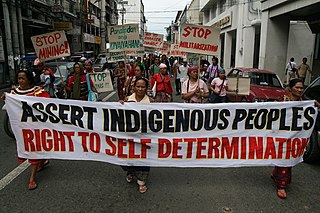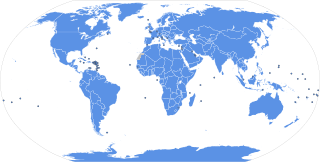Related Research Articles
Citizenship is a relationship between an individual and a state to which the individual owes allegiance and in turn is entitled to its protection.(quoted)

A government is the system or group of people governing an organized community, generally a state.

Sovereignty is the supreme authority within a territory. Sovereignty entails hierarchy within the state, as well as external autonomy for states. In any state, sovereignty is assigned to the person, body, or institution that has the ultimate authority over other people in order to establish a law or change an existing law. In political theory, sovereignty is a substantive term designating supreme legitimate authority over some polity. In international law, sovereignty is the exercise of power by a state. De jure sovereignty refers to the legal right to do so; de facto sovereignty refers to the factual ability to do so. This can become an issue of special concern upon the failure of the usual expectation that de jure and de facto sovereignty exist at the place and time of concern, and reside within the same organization.

The right of a people to self-determination is a cardinal principle in modern international law, binding, as such, on the United Nations as authoritative interpretation of the Charter's norms. It states that peoples, based on respect for the principle of equal rights and fair equality of opportunity, have the right to freely choose their sovereignty and international political status with no interference.

In moral and political philosophy, the social contract is a theory or model that originated during the Age of Enlightenment and usually concerns the legitimacy of the authority of the state over the individual. Social contract arguments typically posit that individuals have consented, either explicitly or tacitly, to surrender some of their freedoms and submit to the authority in exchange for protection of their remaining rights or maintenance of the social order. The relation between natural and legal rights is often a topic of social contract theory. The term takes its name from The Social Contract, a 1762 book by Jean-Jacques Rousseau that discussed this concept. Although the antecedents of social contract theory are found in antiquity, in Greek and Stoic philosophy and Roman and Canon Law, the heyday of the social contract was the mid-17th to early 19th centuries, when it emerged as the leading doctrine of political legitimacy.

A federation is a political entity characterized by a union of partially self-governing provinces, states, or other regions under a central federal government (federalism). In a federation, the self-governing status of the component states, as well as the division of power between them and the central government, is typically constitutionally entrenched and may not be altered by a unilateral decision of either party, the states or the federal political body. Alternatively, a federation is a form of government in which sovereign power is formally divided between a central authority and a number of constituent regions so that each region retains some degree of control over its internal affairs.
In philosophy, economics, and political science, the common good refers to either what is shared and beneficial for all or most members of a given community, or alternatively, what is achieved by citizenship, collective action, and active participation in the realm of politics and public service. The concept of the common good differs significantly among philosophical doctrines. Early conceptions of the common good were set out by Ancient Greek philosophers, including Aristotle and Plato. One understanding of the common good rooted in Aristotle's philosophy remains in common usage today, referring to what one contemporary scholar calls the "good proper to, and attainable only by, the community, yet individually shared by its members."
The tyranny of the majority is an inherent weakness to majority rule in which the majority of an electorate pursues exclusively its own objectives at the expense of those of the minority factions. This results in oppression of minority groups comparable to that of a tyrant or despot, argued John Stuart Mill in his 1859 book On Liberty.
Popular sovereignty is the principle that the authority of a state and its government are created and sustained by the consent of its people, through their elected representatives, who are the source of all political power. It is closely associated with social contract philosophers such as Thomas Hobbes, John Locke and Jean-Jacques Rousseau. Popular sovereignty expresses a concept, and does not necessarily reflect or describe a political reality. Benjamin Franklin expressed the concept when he wrote, "In free governments, the rulers are the servants and the people their superiors and sovereigns".

Negative liberty is freedom from interference by other people. Negative liberty is primarily concerned with freedom from external restraint and contrasts with positive liberty. The distinction was introduced by Isaiah Berlin in his 1958 lecture "Two Concepts of Liberty".
Self-ownership, also known as sovereignty of the individual or individual sovereignty, is the concept of property in one's own person, expressed as the moral or natural right of a person to have bodily integrity and be the exclusive controller of one's own body and life. Self-ownership is a central idea in several political philosophies that emphasize individualism, such as libertarianism, liberalism, and anarchism.

William Kymlicka is a Canadian political philosopher best known for his work on multiculturalism and animal ethics. He is currently Professor of Philosophy and Canada Research Chair in Political Philosophy at Queen's University at Kingston, and Recurrent Visiting Professor in the Nationalism Studies program at the Central European University in Budapest, Hungary. For over 20 years, he has lived a vegan lifestyle, and he is married to the Canadian author and animal rights activist Sue Donaldson.
Global citizenship is the idea that one's identity transcends geography or political borders and that responsibilities or rights are derived from membership in a broader class: "humanity". This does not mean that such a person denounces or waives their nationality or other, more local identities, but that such identities are given "second place" to their membership in a global community. Extended, the idea leads to questions about the state of global society in the age of globalization.
The Reid Commission was an independent commission responsible for drafting the Constitution of the Federation of Malaya prior to Malayan independence from the United Kingdom of Great Britain and Northern Ireland on 31 August 1957.

Constitutional patriotism is the idea that people should form a political attachment to the norms and values of a pluralistic liberal democratic constitution rather than a national culture or cosmopolitan society. It is associated with post-nationalist identity, because it is seen as a similar concept to nationalism, but as an attachment-based on values of the constitution rather than a national culture. In essence, it is an attempt to re-conceptualize group identity with a focus on the interpretation of citizenship as a loyalty that goes beyond individuals' ethnocultural identification. Theorists believe this to be more defensible than other forms of shared commitment in a diverse modern state with multiple languages and group identities. It is particularly relevant in post-national democratic states in which multiple cultural and ethnic groups coexist. It was influential in the development of the European Union and a key to Europeanism as a basis for multiple countries belonging to a supranational union.

A sovereign state, also known as sovereign country, is a political entity represented by one centralized government that has sovereignty over a geographic area. International law defines sovereign states as having a permanent population, defined territory, one government, and the capacity to enter into relations with other sovereign states. It is also normally understood that a sovereign state is independent. According to the declarative theory of statehood, a sovereign state can exist without being recognised by other sovereign states. Unrecognised states will often find it difficult to exercise full treaty-making powers or engage in diplomatic relations with other sovereign states.

The 1974 Yugoslav Constitution was the fourth and final constitution of the Socialist Federal Republic of Yugoslavia. It came into effect on 21 February 1974.

History of citizenship describes the changing relation between an individual and the state, commonly known as citizenship. Citizenship is generally identified not as an aspect of Eastern civilization but of Western civilization. There is a general view that citizenship in ancient times was a simpler relation than modern forms of citizenship, although this view has been challenged.
International legal theory comprises a variety of theoretical and methodological approaches used to explain and analyse the content, formation and effectiveness of public international law and institutions and to suggest improvements. Some approaches center on the question of compliance: why states follow international norms in the absence of a coercive power that ensures compliance. Other approaches focus on the problem of the formation of international rules: why states voluntarily adopt international legal norms, that limit their freedom of action, in the absence of a world legislature. Other perspectives are policy oriented; they elaborate theoretical frameworks and instruments to criticize the existing rules and make suggestions on how to improve them. Some of these approaches are based on domestic legal theory, others are interdisciplinary, while others have been developed expressly to analyse international law.
In the United States, tribal disenrollment is a process by which a Native American individual loses citizenship or the right to belong within a Native American tribe.
References
- ↑ Whelan, Frederick G. (1983). "Prologue: Democratic Theory and the Boundary Problem". Nomos. 25: 13–47. Retrieved 3 March 2022.
- ↑ Jennings, Sir Ivor (1956). The Approach to Self-Government. Cambridge University Press. p. 56. Retrieved 3 March 2022.